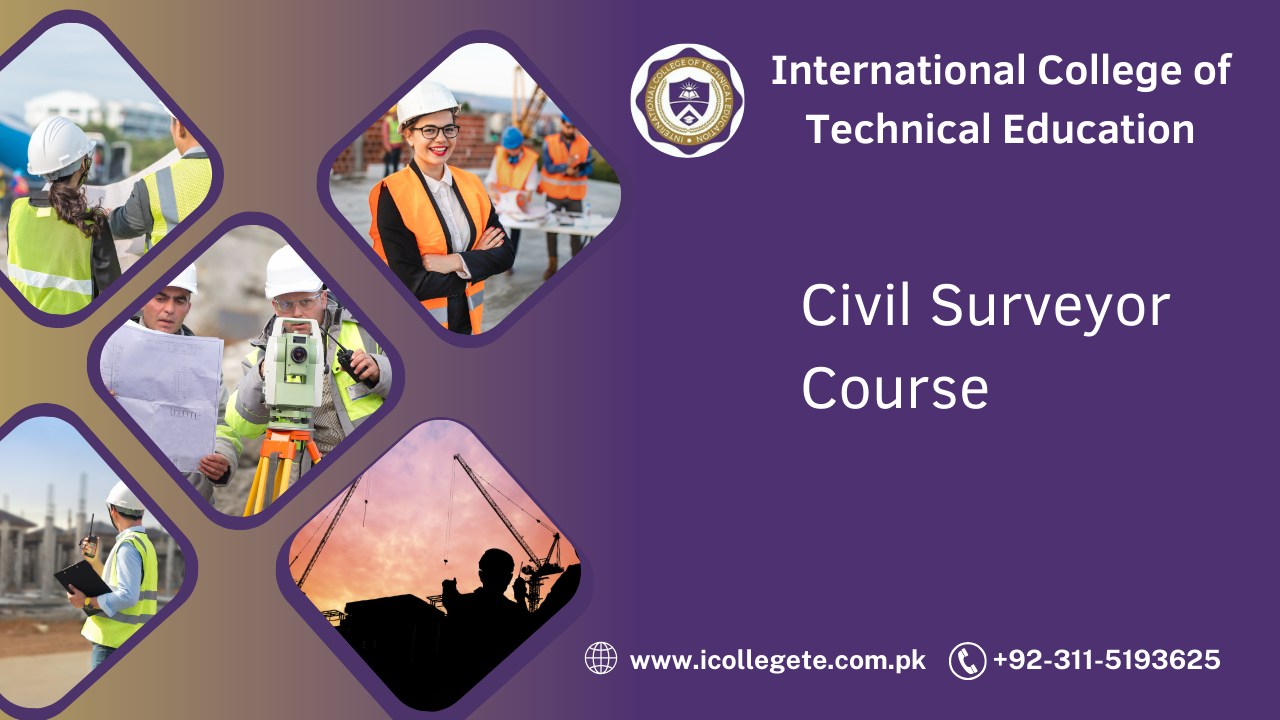The role of a civil surveyor is crucial in the construction and infrastructure industries. These professionals play an integral part in planning, designing, and implementing projects by collecting and analyzing land data for construction sites, roads, bridges, and other structures.
The Civil Surveyor course is designed to equip students with the necessary skills and knowledge to carry out surveying tasks, interpret topographical data, and work with modern surveying equipment. This course prepares individuals for a career in civil engineering by covering various surveying methods, land measurement techniques, and data analysis procedures. By the end of the course, students will be capable of contributing to the design and construction of engineering projects, ensuring accuracy and efficiency.
Course Overview
The Civil Surveyor course is a specialized program focused on providing practical and theoretical insights into surveying principles and techniques. Rawalpindi, being a hub for infrastructure development, offers students an excellent opportunity to study and train in an environment closely tied to real-world applications of civil surveying.
Key components of the course include:
- Introduction to Surveying Techniques: Learn the basic principles of land surveying, including measurements, data collection, and analysis.
- Surveying Instruments: Gain hands-on experience with tools like total stations, GPS, levels, and drones used for precise measurements.
- Topographic and Boundary Surveys: Understand how to map land contours, property boundaries, and features of the terrain.
- Data Analysis and Reporting: Learn how to process raw data into usable formats and generate accurate reports.
- Geospatial Technology: Explore advanced tools like GIS (Geographic Information Systems) and remote sensing technologies.
Study Units
The Civil Surveyor course typically consists of the following study units:
- Introduction to Surveying: An overview of surveying, its importance, and the history of the profession.
- Surveying Tools and Equipment: Understanding different types of surveying instruments and their proper use.
- Measurement Techniques: Detailed training on measuring distances, angles, and elevations.
- Mapping and Plotting: Learning how to convert raw survey data into maps and plots.
- Legal and Ethical Aspects of Surveying: Overview of land laws, ethics, and responsibilities of a surveyor.
- GIS and Remote Sensing: Introduction to modern geospatial tools used for land analysis.
- Surveying for Infrastructure Projects: Special focus on surveying techniques for roads, bridges, and buildings.
Learning Outcomes
Upon completing the Civil Surveyor course in Rawalpindi, students will be able to:
- Master the fundamentals of surveying and land measurement.
- Operate and maintain modern surveying instruments.
- Interpret and process survey data accurately.
- Produce high-quality maps, drawings, and reports.
- Apply surveying knowledge to real-world civil engineering projects.
- Understand the legal and ethical framework surrounding land surveying.
- Use GIS and remote sensing technologies for land analysis.
Course Benefits
- Industry-Relevant Skills: The course is designed to meet the demands of the construction and civil engineering industries, ensuring students are prepared for real-world challenges.
- Hands-On Training: The course includes practical sessions, allowing students to work with state-of-the-art equipment and develop technical proficiency.
- High Demand for Surveyors: With rapid urbanization and infrastructure development, surveyors are always in demand, offering stable job prospects.
- Short Duration: The course can typically be completed in a relatively short time, making it an efficient option for those eager to start their careers.
- Competitive Salary: As a trained civil surveyor, individuals can command a good salary due to the specialized skill set.
- Networking Opportunities: Rawalpindi’s growing infrastructure sector provides ample opportunities for networking and job placement after course completion.
Who Is This Course For?
This course is ideal for:
- Aspiring Civil Engineers: Individuals looking to specialize in the surveying aspect of civil engineering.
- High School Graduates: Students who are keen to pursue a career in surveying and construction but don’t wish to commit to a full-fledged engineering degree.
- Existing Professionals: Engineers, architects, and other construction professionals seeking to expand their skillset and specialize in land surveying.
- Tech-Savvy Individuals: Those with an interest in using modern technology and equipment like GPS and GIS for land measurement and analysis.
Future Progression for This Course
After completing the Civil Surveyor course in Rawalpindi, there are several career progression paths to explore:
- Employment as a Surveyor: Graduates can work as land surveyors, site surveyors, or construction surveyors in engineering firms, construction companies, and government departments.
- Further Specialization: Surveyors can specialize in specific fields such as land development, GIS mapping, or remote sensing.
- Advanced Qualifications: Pursuing higher studies in civil engineering or a related field can open doors to senior roles such as project manager or consultant.
- Entrepreneurship: With the expertise gained from the course, graduates can also start their own surveying consultancy or business.
- Certification: Obtaining certification from recognized surveying bodies can further enhance job prospects and salary potential.
The Civil Surveyor course in Rawalpindi offers a valuable opportunity for individuals seeking a career in civil engineering or surveying. With a curriculum designed to provide a blend of theoretical knowledge and practical experience, students are prepared for success in an industry that plays a pivotal role in the development of infrastructure. Whether you’re starting your career, seeking a change in profession, or aiming for specialization, this course offers the essential skills and knowledge for a rewarding future in surveying and civil engineering.






